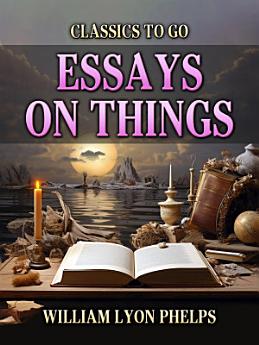Essays On Things
Feb. 2024 · Otbebookpublishing
E-Book
225
Seiten
family_home
Zulässig
info
reportBewertungen und Rezensionen werden nicht geprüft Weitere Informationen
Über dieses E-Book
Excerpt: "At an uncertain hour before dawn in February 1912, as I lay asleep in my room on the top floor of a hotel in the town of Mentone, in Southern France, I was suddenly awakened by the morning star. It was shining with inquisitive splendour directly into my left eye. At that quiet moment, in the last stages of the dying night, this star seemed enormous. It hung out of the velvet sky so far that I thought it was going to fall, and I went out on the balcony of my room to see it drop. The air was windless and mild, and, instead of going back to bed, I decided to stay on the balcony and watch the unfolding drama of the dawn. For every clear dawn in this spectacular universe is a magnificent drama, rising to a superb climax."
Autoren-Profil
William Lyon Phelps (1865-1943) was an influential American author, critic, and scholar whose work left an indelible mark on the literary landscape of the early 20th century. Born in New Haven, Connecticut, Phelps graduated from Yale University, where he later became a beloved professor of English literature. His dynamic teaching style and insightful lectures on modern literature captivated students and the public alike, earning him a reputation as a pioneering educator.Phelps was a prolific writer, contributing essays and critiques to various prestigious publications. His literary contributions extended beyond academia; he was a vocal advocate for contemporary writers, championing the works of authors like James Joyce, F. Scott Fitzgerald, and Ernest Hemingway at a time when their styles were often met with skepticism. Phelps' endorsement helped legitimize modernist literature, influencing both public opinion and literary criticism.Not without controversy, Phelps' outspoken views on literature and culture sometimes clashed with more conservative elements of society. He was a staunch defender of intellectual freedom and often found himself at odds with censorship advocates. His progressive ideas on education and literature resonated with a generation eager for change, making him a key figure in the cultural shifts of his time.Phelps' legacy endures through his contributions to literary criticism and education, as well as his role in shaping the modern literary canon. His ability to bridge the gap between scholarly analysis and public appreciation of literature continues to inspire educators and readers today.
Dieses E-Book bewerten
Deine Meinung ist gefragt!
Informationen zum Lesen
Smartphones und Tablets
Nachdem du die Google Play Bücher App für Android und iPad/iPhone installiert hast, wird diese automatisch mit deinem Konto synchronisiert, sodass du auch unterwegs online und offline lesen kannst.
Laptops und Computer
Im Webbrowser auf deinem Computer kannst du dir Hörbucher anhören, die du bei Google Play gekauft hast.
E-Reader und andere Geräte
Wenn du Bücher auf E-Ink-Geräten lesen möchtest, beispielsweise auf einem Kobo eReader, lade eine Datei herunter und übertrage sie auf dein Gerät. Eine ausführliche Anleitung zum Übertragen der Dateien auf unterstützte E-Reader findest du in der Hilfe.








